I’ve just been in Uganda in East Africa, a country bordered to the east by Kenya, to the north by South Sudan, to the southwest by Rwanda, to the west by the Democratic Republic of the Congo and to the south by Tanzania.

This is a country that has the distinction of being the world’s second most populous landlocked country after Ethiopia. It is home to a substantial portion of Lake Victoria, one of Africa’s Great Lakes and once thought to be the source of the Nile.
It’s also a country where less than 10% of the land that can be owned in this country is owned by women. According to a report by The Forum for African Women Educationalists, (FAWE), Uganda tops the list in Africa of the number of child marriages with 40% of girls marrying before the legal age for marriage which is 18 years. A report by the Population Secretariat states that 300,000 girls get pregnant prematurely each year.
One of the groups supported by Global Fund for Women is Pastoral Women’s Alliance to Break Cultural Chains (PWABC)which was established in 2003 in Kiboga District in northwest Uganda. With a membership of over 2,000 women organized into 13 village groups, the network advocates for pastoralist women’s socio-economic and political rights by reforming cultural practices and traditions that discriminate against women. The group works with male community leaders and elders to advocate for women’s rights and cultural reform at the community level. It also mobilizes and trains members on women’s rights and links members with lawyers, law enforcement and local government departments to shift attitudes and change laws.
One of our advisors in Uganda, Debbie Serwadda joined me on this trip and we left Kampala to travel a few hours through rural villages until we arrived at PWABC’s office.
As we gathered with core members of the group in their office, I remembered Nobel Peace Prize winner Leymah Gbowee’s words at the African Grantmakers Network forum in Tanzania a few days earlier, when she said “The ten year old African girl, rural or urban, is who we need to focus on.” If we don’t pay attention then these girls’ lives play out in a depressingly similar trajectory.
Take, for example, Sylvia Nalwada who had her first baby at 15 when she was a fifth grade primary school student in Kayunga District, Kampala, Uganda. The father was a 27 year old man. Sylvia’s parents reported the case to the police and the man was arrested. Then the man’s parents visited the police station and convinced the police to release their son after a few days. Sylvia was left literally holding the baby, single and in deep poverty, while the father ran free. In other cases girls are kidnapped and forced to marry.
PWABC is working to change this trajectory. The group started in 2003 by working with elders and convincing them of the reasons why the practice of forced marriage and girl kidnappings had to change. The group’s Deputy Director, Dusabe Teo, shared the organization’s genesis with me and showed me photos of herself with a smashed face and black eye that was inflicted by her husband when she started PWABC with some other women.
“Men were working to break our character and to undermine our rights as women and we women wanted to change that. A man talks once and if you don’t listen to him and he talks again then you know you will be beaten. We wanted to change a situation where a woman kneels for the man as God and serves him chicken and eggs and everything nutritious while she is denied this. We wanted girls and women to be valued rather than treated as slaves.”
In Western and Central Uganda many marriages are by abduction. Even if a girl is under 14 and a man is 70 or older the marriage can take place as long as he has cows to pay the bride price. Also cows trump education. Given that cows are regarded as infinitely more valuable than a girl and her education, a girl is often required to forgo an education in order to tend the cow.
In the beginning with PWABC it was ten women who started sensitizing other women, and soon a man joined them in this work. “It was not easy,” said Dusabe, “since many people said ‘you young girls, what are you doing! Just because of some education you have an idea that we’re doing bad things.’ These people in the community thought we had been brainwashed and they were furious that we were challenging their traditions. Most elders and other men first looked at us as becoming unruly!”
The women ramped up their work by engaging girls and women to ‘sensitize’ them of their rights and men to the law and the impact of their behavior. The women in the group started supporting young women who were at risk of being kidnapped and also sensitizing men who wanted to marry girls, including men who practiced polygamy and men who were HIV positive. PWABC wanted to address the reality of girls forced into marriage and forced to pleasure multiple sex partners, then having a high risk of becoming HIV positive.
These PWABC women also worked to support women who had been violated and to challenge men’s belief that it was their right to buy, batter, rape and violate women. Mugabe Herbat Jordan, a teacher, also joined the group after continually witnessing his mother being beaten and after his sister was abducted. “I felt a pinch in my heart, and that we were all diminished by these cultural practices and I wanted to work to change this.”
“Now,” Dusabe says, pointing to a man in the group, “my husband is one of our advocates. He too has changed…It’s not easy for male leaders and community members to join us as these harmful cultural practices run deep. But they could see the effect our work was having in our community and so they decided to support us.”
Today, a whole infrastructure of processes is in place to ensure that girls’ human rights are upheld. This includes an oversight committee that deals with any charges or instances of domestic violence or forced marriage or polygamy. It involves custodians of culture, elders, teachers, paralegals and men in positions of authority being strong advocates for girls’ and women’s rights. In this community this includes a police commissioner who has put in place a process to hold government officials to account for ensuring that they enforce the laws of protection for girls and young women and with harsh penalties for negligence and bribery. It includes the election of young men to counsel other men and tell them the benefits of girls staying in schools and also about their accountability to the group if he or any member of his family seeks out a girl for sexual activity. Young women are also elected to mobilize other young women to be aware of their rights and the power of education.
“Global Fund for Women made this possible,” said Dusabe. “You were our first funder. You gave us our second grant. You gave us our third grant. It wasn’t until after our third grant that the group was able to attract the interest and support of other funders both within Africa and globally. Now we have eight paid staff including a security guard, a counsellor for HIV positive women and children, an accountant, three project officers, an administrator, a paralegal lawyer and many volunteers. Our focus remains on the girl child in the very poor rural villages of Rukoola Bushland, Kisagai and Nsala Nsozi “Mountain” areas, Kasejjere Forests and other villages that are difficult to access and where harmful traditional practices have deep roots.”
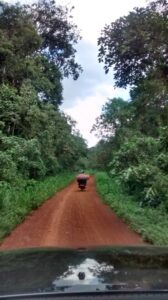 We left PWABC’s offices and headed down a dirt track toward one of the villages to meet some of the community members involved with PWABC. One elder joined us in our vehicle. He is the embodiment of accompaniment and he is there to give his support, as much in presence as in voice. He has been convinced by this work and is a strong advocate for it. “We need the vital confidence of elders,” says Dusabe. “When elders talk, people listen. When elders listen to girls, people listen to girls.”
We left PWABC’s offices and headed down a dirt track toward one of the villages to meet some of the community members involved with PWABC. One elder joined us in our vehicle. He is the embodiment of accompaniment and he is there to give his support, as much in presence as in voice. He has been convinced by this work and is a strong advocate for it. “We need the vital confidence of elders,” says Dusabe. “When elders talk, people listen. When elders listen to girls, people listen to girls.”
This dirt track was the only track leading from the village to the nearest hospital. Beyond the violence of early marriage, many girls and young women have problems giving birth because the hospital is so far away and the very basic facilities don’t allow it to cater to complications.
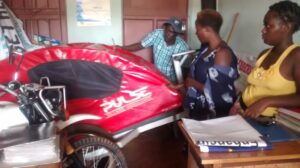 One of the women elders spoke of the consequences of this situation. “My sister died in childbirth in 2012 after she went into a complicated labor at 2:00am in the morning and she died enroute to the hospital.” PWABC secured some funding to create a ‘People’s Ambulance’, a contraption similar to a motorized pedi-cab with a mattress attached so the woman in labor can position herself in the most comfortable way possible. She is then transported to the hospital on the deeply rutted tracks that serve as the tributaries to these communities.
One of the women elders spoke of the consequences of this situation. “My sister died in childbirth in 2012 after she went into a complicated labor at 2:00am in the morning and she died enroute to the hospital.” PWABC secured some funding to create a ‘People’s Ambulance’, a contraption similar to a motorized pedi-cab with a mattress attached so the woman in labor can position herself in the most comfortable way possible. She is then transported to the hospital on the deeply rutted tracks that serve as the tributaries to these communities.
We finally arrived at the local community and many women, men, girls and boys were on hand to greet us. We walked up an incline to a meeting place where there were drummers and dancing. The kind of dancing where everyone is jiving. The beat was infectious and, to the delight of the community, Debbie and I joined the group in clapping, turning, bumping and singing. After some time everyone quieted and Debbie and I were given seats for the formal meeting to commence. Then some of the male and female elders of the community spoke including another Jane, Ms. Jane Kacuiculi, Chairperson of the Board and Mr. Mugabe Herbert Joram, field Coordinator and Paralegal Lawyer.
“We are a strong community of women and men who came out to fight and transform practices that defile girls and women and deny our human rights,” Jane said. “Men have joined hands with women to reform culture and affirm girl child rights. We have worked to end cultural practices that marginalize women. These practices include lack of access to land and ownership of land, sexual ownership of girls and young women by men in the community, and a belief that girls are unimportant and must be submissive to male desire and need.”
“In our culture, whatever a girl or woman has is for the man, whether it’s cows, goats, money or land. When you are about to give birth you are sent back to your father’s home so that he can send you back both with your child and with a cow for your husband. Women become like children in their own homes, as they are passed between husband and father who determine their behavior and their rights. Women become commodities for their husbands to dominate and order as they please. Instead of a girl studying at aged 14, she is locked into a bride price. She is forced into marriage and often gets pregnant soon after which often causes complications and sometimes death.”
We then heard testimony from women and men as to the level of change PWABC had helped to make possible.
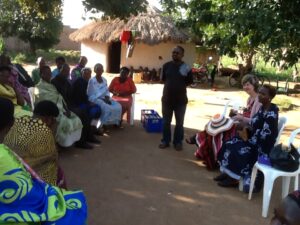 One of the men in the group was a man called Teddy Kyeye, a Government Official who had previously said “Sex is like a Cup of Tea among us pastoralists. There is no way a girl can reach the age of 16 before having sex.” He added that sharing a wife is considered normal in pastoralist culture. One pastoralist confessed that he had sex with the wife of his son shortly after their marriage as he wanted to see what the bride price had bought his son. Kind of like testing the stock after purchase to ensure it was a good deal. Except in such cases it is an old man raping the girl who has been forced to marry his son. Now Teddy Kyeke and the other men at the meeting no longer do this and they are strong advocates for cultural change. He has joined other men in the community who are standing up for women, no longer beating women, no longer controlling women, and advocating for the rights of women and girls.
One of the men in the group was a man called Teddy Kyeye, a Government Official who had previously said “Sex is like a Cup of Tea among us pastoralists. There is no way a girl can reach the age of 16 before having sex.” He added that sharing a wife is considered normal in pastoralist culture. One pastoralist confessed that he had sex with the wife of his son shortly after their marriage as he wanted to see what the bride price had bought his son. Kind of like testing the stock after purchase to ensure it was a good deal. Except in such cases it is an old man raping the girl who has been forced to marry his son. Now Teddy Kyeke and the other men at the meeting no longer do this and they are strong advocates for cultural change. He has joined other men in the community who are standing up for women, no longer beating women, no longer controlling women, and advocating for the rights of women and girls.
PWABC has been focused on shifting attitudes and behavior and it has been equally focused on increasing economic opportunity and security for girls and women. “We have many practical ideas about what we can do to generate income and we need capital to make these ideas a reality and, in other cases, to access to markets to connect the creator to the buyer.” The group established Balissa House to provide training in business skills and PWABC also established Balissa Farm as a demonstration farm to be able to support women to become self-sufficient through access to small plots of land. Women are now using milk from cows to make ghee and cheese to generate income and with the hope of creating social enterprises. They are also involved in group savings programs to invest in group projects.
And there is the desire to diversify and increase income streams in the time ahead. As Dusabe explained, “These women also make beautiful textiles and handicrafts and we’d like to establish a handicraft selling center in Kampala so that this could be a base for income for women. We know we could have even greater impact if we have more access to funds and resources to support women to become self-sufficient.
Dusabe also said that many women would also benefit from simple hand tools to improve the backbreaking work on the land and from solar power to support their work at home, if they could afford the installation cost. Having access to land was key to girls and women having dependable income and becoming economically secure. This would open up options for their children to be educated, and for access to transport that would also mean they were mobile in sourcing potential markets and buyers for their work.
Another woman was fiercer and more direct in her advocacy. “Let the harvest belong to women and not be owned by men. Let the woman have her own harvest!” There were many feisty women in this community, old and young. Yes, they were engaged in powerful healing work and yet they were also impatient for change. These women were determined to hold their men to account for their collective behavior and attitudes, and to assume the leadership needed for the level of change sought.
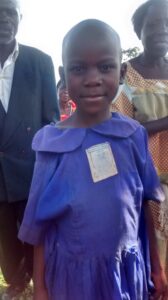 It has been this vigilance at every level that has resulted in an increase in the number of girls attending school. I was transfixed by one girl in the meeting, Nyabare Sala, who was a 7 year old girl in the community who is attending school and hopes to complete her education. She is one of the direct beneficiaries of PWABC’s work. A few years earlier it was girls only a few years older than Nyabare who were being kidnapped on the way to school as they have to walk many miles down that isolated dirt track and they can easily be scooped up by motorcyclists or stopped by cars and taken into a life of sexual slavery. It’s also why some of the money PWABC received from Global Fund went toward buying a motorcycle to intercept such abductors and to not lose another generation of girls while PWABC was doing the work to ensure long term attitudinal change and legal protection.
It has been this vigilance at every level that has resulted in an increase in the number of girls attending school. I was transfixed by one girl in the meeting, Nyabare Sala, who was a 7 year old girl in the community who is attending school and hopes to complete her education. She is one of the direct beneficiaries of PWABC’s work. A few years earlier it was girls only a few years older than Nyabare who were being kidnapped on the way to school as they have to walk many miles down that isolated dirt track and they can easily be scooped up by motorcyclists or stopped by cars and taken into a life of sexual slavery. It’s also why some of the money PWABC received from Global Fund went toward buying a motorcycle to intercept such abductors and to not lose another generation of girls while PWABC was doing the work to ensure long term attitudinal change and legal protection.
“What would you like to do if money was no object?” I asked the group. We would like to become a national network and bring this work and approach to every community in Uganda,” said Dusabe. We know this approach works and we just need the funds to make this possible.” This would be a way of democratizing many communities across Uganda and engaging them in a national public dialogue on conflict resolution, gender equality and community building. The work in each community would start by winning the trust of the elders and then other leaders in the community, and then conducting sessions with all members of the community regarding rights of girls, establishing community committees and introducing all other elements of economic support.
Later, I reflected on the strength of this idea of creating a network when I was talking to a friend and mentor, Michaela Walsh, founder of Women’s World Banking. “The idea of bigness in this world is wrong!” she said to me. “Supporting women in their countries to assume their own leadership and adopt a network model of working is what will really make a difference.”
When it came time for me to speak to the group I said that girls have the right to the same opportunities given to men and boys, and girls have the right to dream as boys do dream. There is a quote by the philosopher, Goethe, that boldness has genius and magic in it, and this community has demonstrated its ability to be bold and the result is a kind of alchemy and magic. There would be no Global Fund for Women without groups like this one. And this community also has the power of Global Fund backing them – the power of hundreds of thousands of women who are a voice of conscience and invoking the power of witness as much as activism for change.
I said that the profound healing the community had been practicing was inspirational as much as transformational. “Your community may be experiencing economic poverty, however, many people in the west are suffering from spiritual poverty whereas your community has been through a spiritual transformation and renewal.” I said that while this community was expressing its gratitude for the funding made possible from Global Fund for Women, they needed to know that there were many donors themselves experienced profound change as a result of giving to women’s groups such as PWABC. “I have met donors who have themselves experienced violence, isolation and discrimination, and when they have seen the powerful outcomes achieved by the groups they have funded it has healed something deep in them and instilled in them a strong sense of hope, and belief that change is possible.
A few days after I returned to the United States I received an email from Dusabe profusely thanking me for visiting the community.
Oh dear Jane it was a day of joy to host you at our PWABC Office and most importantly thank you for your time to share with our beneficiaries on grassroot in the rural Communities. You mean much to us women/girls of Kiboga and the whole World Jane!…Indeed with you we shall break these chains further more and even reach out to other communities in and outside Uganda to also open the eyes of our fellow women/girls harassed sexually and generally marginalized by their own cultures to stand up, break the chains too by reforming their cultures too…We enjoyed you Jane and the community people enjoyed you so so and so much. Thank you for that parental love! Your visit left us empowered the more spiritually Jane and God bless you. Faithfully yours in the campaign of our rights as women/girls of Kiboga.
As someone who has often grieved the fact that I haven’t been a parent it felt like a precious gift to be thanked for my parenting.
A day later Jane Kacuculi, the Chairperson Board of Directors, PWABC wrote to me:
the best we can do is…STRONGLY ensuring that women/girl child rights are observed, recognized and respected socially, economically and politically through our initiative of Reforming Cultures to eliminate negative harsh and dangerous Practices/Beliefs here in our rukoola communities and take the initiative to other communities where women/girl child(ren) are equally suffering and marginalized because of their own cultures…
What can we say about your love and support? We wish all Donors had your appreciative…character then most grantees would be psychologically strengthened in the important work they try to do. To be honest Jane you left us Psychologically strengthened and feeling important in our work …We therefore credit your visit as a turning point for our advocacy…
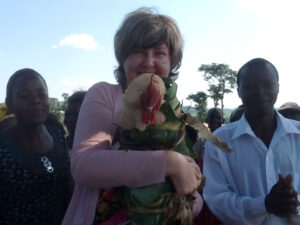 Once formal business and speeches had ended the drums started again and this time as we danced a live chicken was lifted up and held out to me, “a great honor,” Debbie whispered to me as I dubiously opened my arms to receive the squawking squirming chook. And so we danced, that chook and I, and the community erupted in laughter and clapping and stepped up the beat until it became a throbbing sea of bodies and ululation, or udhalili, as it is called in Swahili. It reminded me of being in Arnhem Land, Aboriginal land in Australia, and experiencing the incredible energy of the Chookie Dancers as they created their own version of Zorba the Greek.
Once formal business and speeches had ended the drums started again and this time as we danced a live chicken was lifted up and held out to me, “a great honor,” Debbie whispered to me as I dubiously opened my arms to receive the squawking squirming chook. And so we danced, that chook and I, and the community erupted in laughter and clapping and stepped up the beat until it became a throbbing sea of bodies and ululation, or udhalili, as it is called in Swahili. It reminded me of being in Arnhem Land, Aboriginal land in Australia, and experiencing the incredible energy of the Chookie Dancers as they created their own version of Zorba the Greek.
I reached out to Nyabare to shake her hand and say goodbye. Her mother was with her and they both smiled. I would not forget her. The ten year old African girl is who we need to be focusing on, Leymah Gbowe said. Nyabare was a little younger, there was still time to support this extraordinary group and their dream to become a national movement. Perhaps it would be Nyarabe leading it.
The warmth of many hands and hearts farewelled Debbie and I as we drove off in our vehicle and headed back down the rutted track from which we came. We were quiet, each lost in our own thoughts after what to me seemed akin to a spiritual experience, such was the force of the people and their mission for change.
Suddenly I heard a squawk from the back of the vehicle. It was the chook.
We may have left the community but the chook was here to stay.
Jane Sloane
Uganda
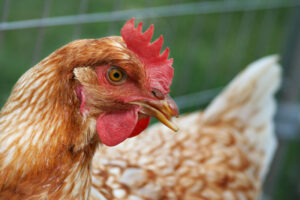
Photos
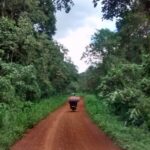
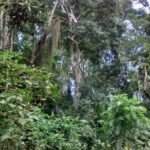
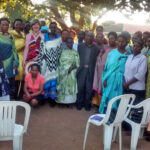
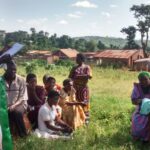
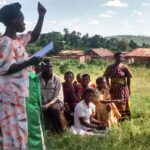
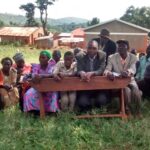
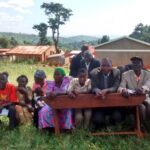
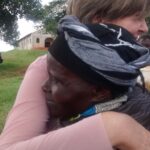
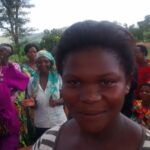
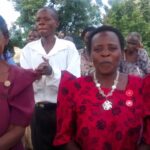
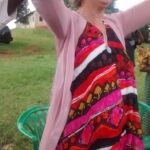
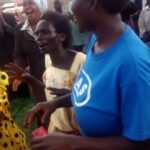
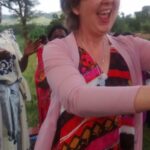
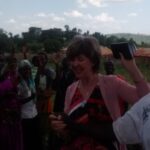
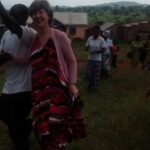
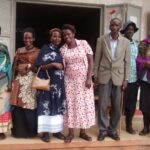
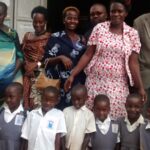
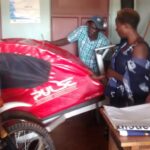
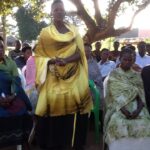
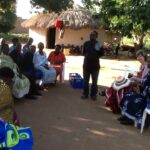
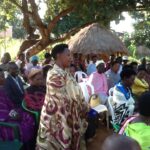
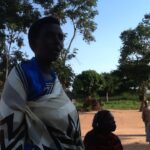
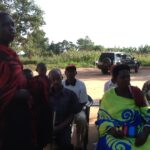
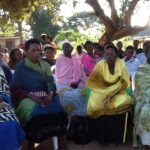
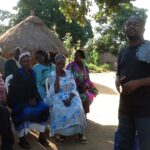
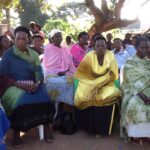
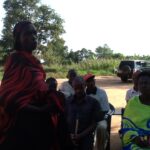
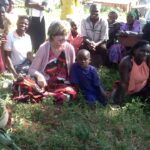
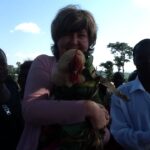
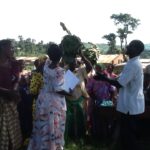
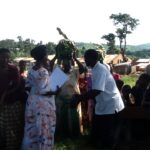
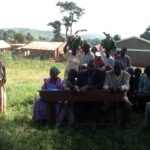
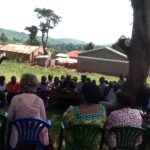
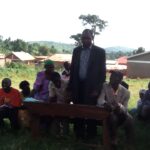
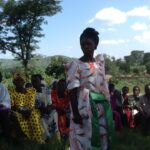
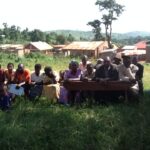
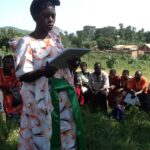
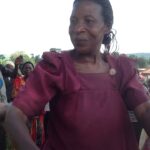
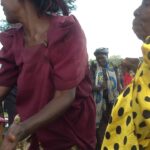
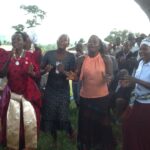
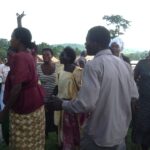
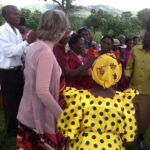
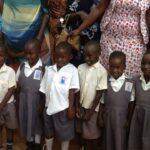
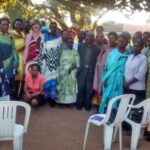
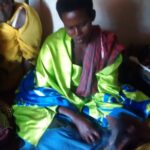
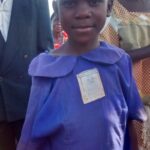
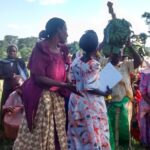
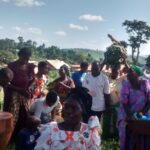
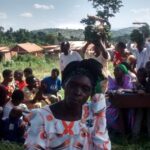
This is beautiful! What an incredible trip. You are doing such important work. Thank you for the inspiring letter from Uganda. XO!